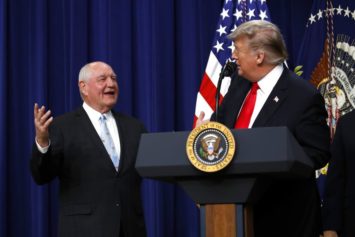While conservatives are interpreting the continued existence of poverty in the U.S. as proof that President Lyndon Johnson’s “War on Poverty” launched 50 years ago is a failure, a new study from Columbia University reveals that the effort has done much of what it was intended to do.
If Johnson hadn’t pushed through Congress such programs as food stamps, Medicaid and the Earned Income Tax Credit, America’s poverty rate would be twice as bad as it is now.
The government programs have been especially effective at reducing the “deep poverty rate”—the share of people living below 50 percent of the poverty threshold. According to the researchers, the deep poverty rate would have been 19.2 percent in 2012 without government programs. Instead, it was 5.3 percent.
“These government policies and programs have really kept that deep poverty rate pretty remarkably flat,” Chris Wimer, a research scientist at Columbia University’s Population Research Center and one of the authors of the study, told the Huffington Post. “Even as the business cycle goes up and down, we’ve been able to hold back real serious deprivation at the bottom.”
Though Republicans have been on a quest to cut food stamps and Social Security, the Columbia study says those government programs and others are keeping millions of Americans out of poverty and were particularly important during the recession.
Researchers found that in 2012, the supplemental poverty measure was 16 percent, but it would have been 31 percent without programs like food stamps, Medicaid and Social Security.
“You’re not seeing nearly the jumps in poverty under the supplemental poverty measure as you saw in previous recessions, and that seems to be because we took a lot of concrete policy actions,” like extending unemployment benefits and expanding the food stamp program, Wimer said. “These things have sort of stanched some of the bleeding in the economy.”
Many conservatives are pointing a finger at American culture—rather than the excesses of capitalism, corporate greed and the death of manufacturing jobs—as the reason that poverty still persists in the U.S.
Josh Good from the conservative think-tank American Enterprise Institute blames anti-poverty programs for the increase in fatherlessness in communities, such as among African-Americans.
“Our current anti-poverty policy wrongly allows young men to impregnate young women and walk away, because teenage moms—aided by the state—can raise children without present fathers,” Good writes. “Culturally, we are wrong to provide perpetual relief, in the name of compassion, when development is what is needed. Single mothers and rootless fathers require not more material relief but job training, purposeful education, life-skills coaching, and, most of all, personal investment from trustworthy individuals who can mentor and instill different habits. The truth is that only the free market backed by stronger civil society can lift people out of poverty in a sustainable way.”
Good called on President Obama to use his Jan. 28 State of the Union address to confront father absence as a way of closing the income gap.
“But instead, after $20 trillion in real spending on the War on Poverty, I anticipate we’ll hear a public call for still more federal spending aimed at aiding ‘our neediest citizens,’ or overcoming income inequality through new government-led reforms,” he writes. “On its golden anniversary, our War on Poverty needs to renew its vows but with a decidedly new kind of commitment. Through deliberative, rigorous analysis of means-tested programs, we should move toward reforms that promote personal dignity, incentivize father involvement and encourage work.”



